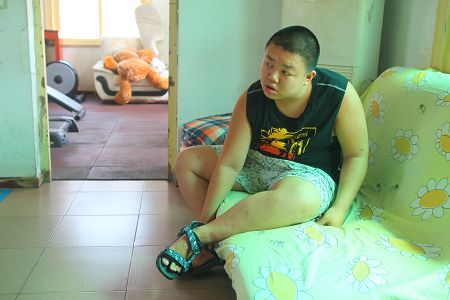Fallen from the stars
Six children who live in the Beijing Stars and Rain group home rarely, if ever interact, but they do have one thing in common: They love the bathroom. For them, it's not just a place to pee, but also a place to play, to eat, to hide and to venture.
|
An autistic boy rests in the living room. |
Ma Xin, 16, pale and thin, loves peeing everywhere - except in the toilet. And he obsessively brushes his teeth every time he enters the bathroom.
Li Zhuoning, 14, is the only girl among the six. She has dark, wide and unfocused eyes. She likes leaving the toilet door open and putting things into her mouth, such as toothpaste, soap and washing power. She never tells people how they taste, though.
Lian Ziming, 14, seems very much into music as unintelligible sounds keep coming from his mouth. He also likes the sound of a flushing toilet, but never bothers to wipe himself.
At 187 centimeters tall, Zhu Yao, 15, is the tallest and likes playing with socks in the bathroom, rather than basketball on the basketball court.
Yes, they have problems using the bathroom correctly. Yes, they are different from other children. They are autistic, a neural disorder characterized by impaired social interaction and communication as well as repetitive behaviors or limited interests.
Most autistic individuals exhibit some form of mental retardation. It is a life-long non-progressive developmental disability with no identified cause or cure.
Little understood
About 41,000 children aged six and below have autism in China, according to a survey conducted by the Ministry of Health in 2005. Yang Xiaoling, chairperson of the Beijing Association for Rehabilitation of Autistic Children, estimated that there are at least 1 million autistic children in China, where, unlike Western countries such as the US, the disorder is little known or understood by the general public.
There are different degrees of autism and a few individuals, such as the late Kim Peek, inspiration for the character Raymond Babbit in the movie Rain Man, and a female professor of animal science at Colorado State University named Temple Grandin, who, while not "cured," have gone on to lead extraordinary lives despite the disorder.
But they are the exception and in a smaller way so are the children at Beijing Stars and Rain, founded in 1992 as the country's first private educational organization for autistic children. Many others in China, however, are locked at home because their parents do not know how to deal with them.
"Some organizations promise to 'cure' autism, but we only promise to improve their quality of life and help them to reach their full potential," Wang Xiuqing, head teacher of Stars and Rain, told the Global Times.
"We call them 'children of the stars'," she said. "Because they dropped down on the earth and broke into people's life just like raindrops, we should show them how beautiful our world is."
Stars and Rain has received donations from foreign countries since 1994 when American Reader's Digest and the South China Morning Post did a story about founder, Tian Huiping, who discovered her son was autistic at the age of two. Wang said that their group home project needs donations of more than 380,000 yuan (US$55,860) a year to survive.
The group home project started in 2006 and accommodates six teenagers. They live there from Monday to Friday and are taught practical skills including housework, calculations and communication. The tuition fee is 1,250 yuan a month.
"The project was designed for children between ages 12 to 16, now some of them are already 16," said Wang. "We don't know if we should ask them to leave or not and we don't know how to take care of them if we don't get enough donations next year."
 0
0 








Go to Forum >>0 Comments